By Ina Lee, Communications Director, Yemen Relief and Reconstruction Foundation
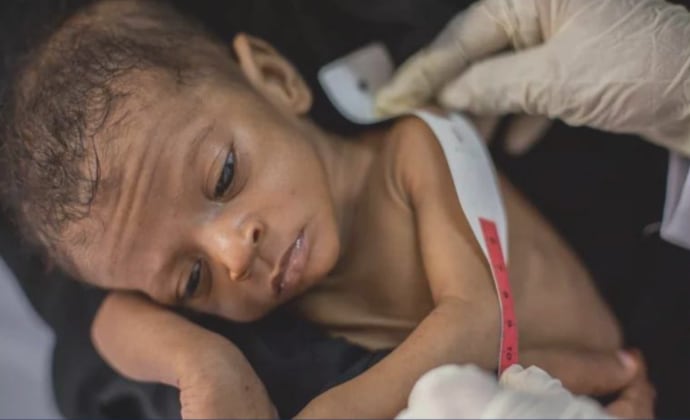
A child suffering from severe malnutrition. Photo: YRRF
Yemen is at the epicenter of one of the world’s most severe humanitarian crises, where years of conflict, economic devastation, and climate extremes have left millions without reliable access to food. Today, over 17 million Yemenis – more than half the population – don’t know when they will eat their next meal. The Yemen Relief and Reconstruction Foundation (YRRF) is at the forefront of addressing this crisis, committed to providing life-saving nutrition and medical support to Yemen’s most vulnerable: its children.
Yemen’s Hunger Crisis
Our mission is set against a complex and urgent backdrop, where Yemen’s food crisis results from years of compounded challenges:
- War: Ongoing conflict has displaced 4.5 million people and pushed 17 million into acute hunger. War destroys lives, uproots communities, and disrupts food systems, making it the primary driver of hunger in Yemen.
- Economic Instability: Yemen is one of the poorest countries in the Middle East and North Africa (MENA) region, ranking 168th out of 177 countries on the Human Development Index, with 80% of the population living below the poverty line. Currency devaluation and high costs of goods make even basic food inaccessible for millions, worsening the hunger crisis.
- Climate Extremes: Climate change intensifies Yemen’s already scarce water resources. Severe droughts, flash floods, and rising sea levels destroy crops, erode soils, and contaminate freshwater sources. In a country with limited agricultural potential, these climate extremes hit especially hard.
Despite these enormous challenges, we are committed to supporting Yemen’s most vulnerable children with targeted nutrition programs aimed at reducing malnutrition, improving health, and restoring hope for families in need.
Reaching Yemen’s Most Vulnerable
Since the beginning of 2024, we have been supporting over 2,600 children suffering from Severe Acute Malnutrition (SAM) and Moderate Acute Malnutrition (MAM) across Yemen’s hardest-hit areas: Aljarahi, Almatamah, AlSadah, Alsokhna, Jabal Habashi, Jabal Sabir, Alhwatah, and Koaedenah. These regions, marked by poverty and limited access to resources, face some of the most severe needs. In more populated areas, such as Aljarahi and Koaedenah, we allocate additional resources to reach a greater number of children.
Our approach goes beyond immediate nutritional aid. We distribute high-protein formulas and food supplements, along with six months of post-treatment care for each child discharged from the treatment centers. This continued care is critical for lowering relapse rates and ensuring children can grow, develop, and recover fully. By educating families on proper feeding practices, we enable them to support their children’s long-term health, protecting them from the risk of malnutrition.
This approach benefits entire families and communities. When children receive adequate nutrition, they become stronger, less susceptible to illness, and better able to avoid costly medical treatments, easing the financial burden on families. Healthier children are more likely to succeed academically and, in time, contribute to the social and economic vitality of their communities. Our model of extended care fosters sustainable health improvements, building resilience and hope for families living under some of the most challenging conditions imaginable.
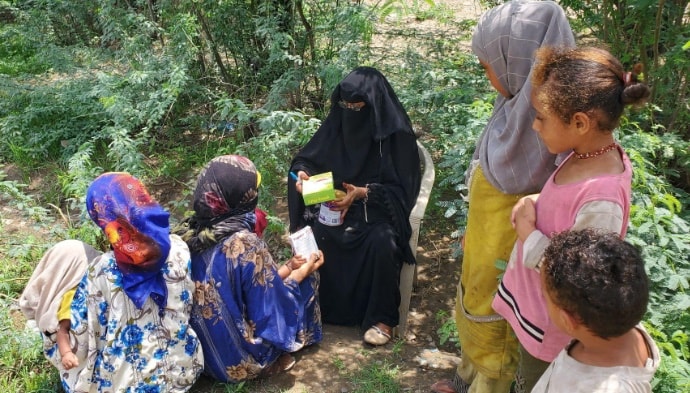
Providing vital nutrition and health information to mothers at clinics and community sites. Photo: YRRF
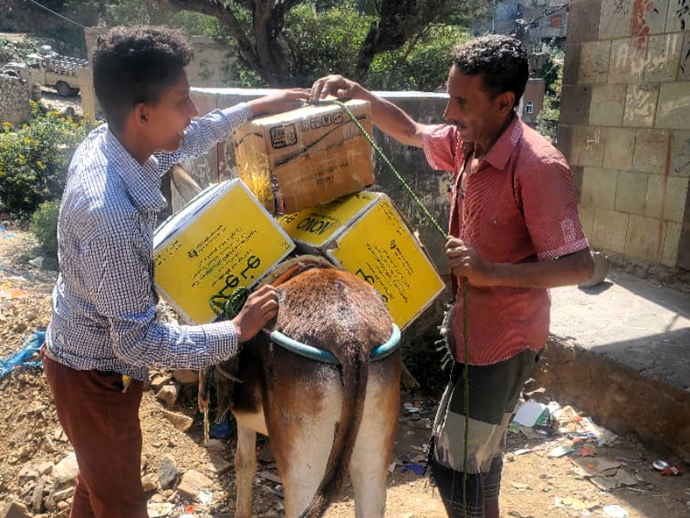
Delivering nutritional supplements to remote, mountainous areas in Jabal Sabir, Taiz. Photo: YRRF
Stories of Resilience
Amid the crisis, our work has brought to light the stories of children and families who have fought against the odds of survival. Here are two children who, with our support, are finding their way from survival to recovery.
Kareema, a 13-month-old girl from a remote village in the Matamah area, was born healthy. However, her family’s struggle with severe poverty, compounded by the challenges of war and blockade, changed her life drastically. By 9 months old, Kareema had developed SAM, accompanied by relentless diarrhea, vomiting, and fatigue. Her growth stalled, and she appeared much younger than her age.
Realizing the severity of her condition, Kareema’s mother brought her to a local center, where her diagnosis of SAM brought her case to our team’s attention. We quickly enrolled her in our malnutrition treatment program, providing nutritional support, medicine, and formula. Four months later, Kareema’s health showed a remarkable turnaround. Her weight returned to normal, and her overall health improved significantly.
Kareema’s father expressed his gratitude: “If it wasn’t for your support, Kareema would not have survived. You saved her life.” Her recovery shows the impact that timely intervention can make, even in the toughest conditions.
Badir, a young boy from Al Jarahi, Hodeidah, was also in critical condition. His mother had always thought he would stay small and frail, not realizing that his condition was the result of severe malnutrition. As Badir’s health continued to decline, her concern grew, and she brought him to our team. Upon examination, we found his Mid-Upper Arm Circumference (MUAC) was just 9 centimeters (cm), indicating SAM.
We immediately enrolled Badir in our treatment program, providing specialized nutritional formula, medicine, and food, with weekly follow-ups. During one visit, his mother expressed relief: “In the first week of treatment, I saw Badir starting to bloom like a flower in front of my eyes. Before that, I used to watch him go to sleep at night, not sure if he’d wake up the next morning. You have brought extreme joy to my heart.”
Badir’s progress was remarkable. After the first month, his MUAC increased from 9 to 10.5 cm. We continued to provide Badir with nutritional supplements and guided his mother on feeding and treatment practices. By the second month, his MUAC had increased to 11 cm, moving him from SAM to MAM. Over the following months, his health steadily improved, and by the sixth month, he reached a healthy weight for his age.
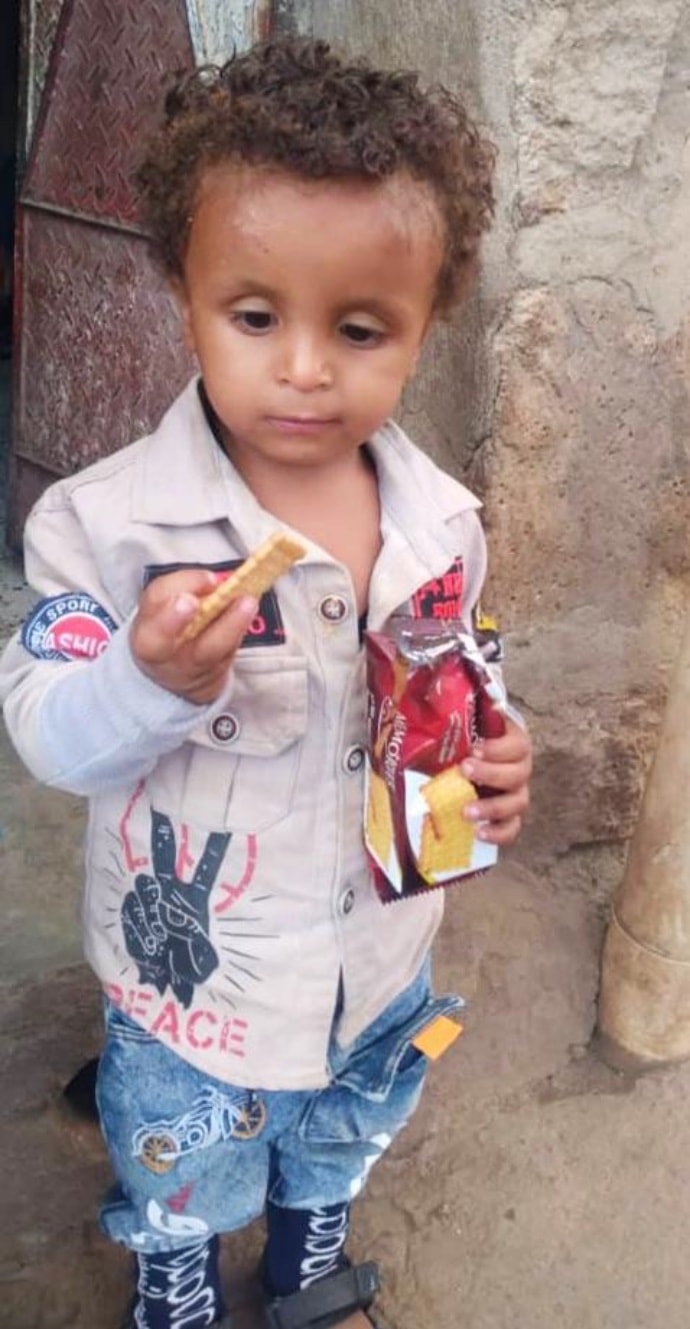
Badir shows improvement after receiving nutritional support. Photo: YRRF
These stories of resilience inspire us each day, strengthening our commitment to supporting Yemen’s children and families through these challenging times.
The Path Forward
Our ongoing efforts in Yemen have provided valuable insights that shape and refine our approach, enabling us to support the country’s most vulnerable. By carefully assessing the distinct needs of each community, we allocate resources effectively, ensuring even the hardest-to-reach children receive the help they deserve. Alongside nutritional support, our strong community partnerships have fostered trust, helping us reach families in areas that are often neglected. As the situation in Yemen remains unpredictable, our flexibility in adapting to new challenges and needs allows us to deliver essential aid to those who need it most.
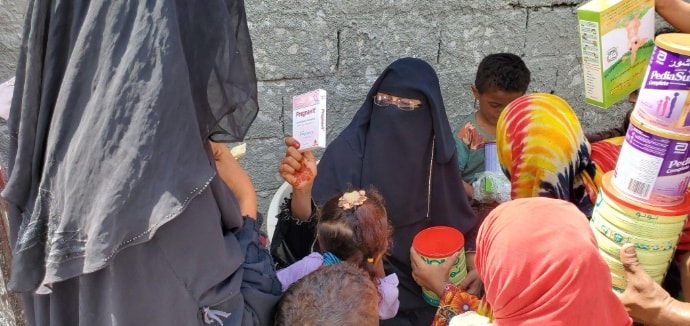
A healthcare professional shares information with mothers on recognizing and managing malnutrition. Photo: YRRF
Uniting for Yemen’s Future
As Yemen’s crisis escalates, coordinated global support is urgently needed. Conflict, poverty, and climate extremes have intensified food insecurity and malnutrition, affecting millions. Yet, targeted, locally informed initiatives – like our malnutrition treatment program – can save countless lives and offer a way out of hunger and despair.
Together, we can help ensure that children like Kareema and Badir not only survive but also have the chance to build a brighter, healthier future. To learn more about our mission and join us in this life-saving work, please visit our website at yemenfoundation.org. Every contribution, no matter the size, brings us closer to a world where no child suffers from hunger.